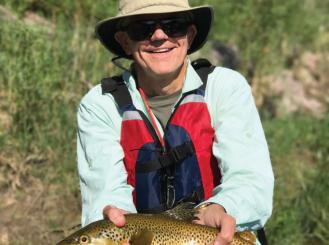Jan 07, 2019
Senior director for clinical affairs and physician in chief at Huntsman Cancer Institute, University of Utah; professor of medicine in the Department of Hematology at the University of Utah; ASCO Daily News editor in chief.
What led you to oncology?
JS: I went to medical school at St Bartholomew’s Hospital in London—it was one of the first medical schools in the United Kingdom to start a medical oncology program and I was attracted by the energy and enthusiasm of the faculty. They were great teachers and mentors. As I progressed through internal medicine training, I was attracted by the mix of science and patient care that was (and still is) so special in cancer medicine. I realized that for me, oncology was the perfect mix of science and academic interest, along with exciting, challenging, and rewarding patient care.
What’s the last book you read?
JS: I have recently read Ron Chernow’s biography of George Washington—I really enjoy learning about American history and gaining insights into the personalities and driving forces behind great leaders. I’ve also recently read James Comey’s A Higher Loyalty. For different reasons, both books remind me of the importance of personal integrity and the humility and insight to understand and admit to mistakes.
What hobbies do you enjoy?
JS: My wife and I have been lucky enough to live in beautiful parts of the country and love to hike and kayak. Despite my complete lack of skill and only rare successes at catching anything, I love to fly fish. The picture shows one of the rare occasions when I have actually caught a decent-sized trout! A day on a gorgeous river with our family and a fly rod is the perfect escape, even when I catch nothing (which is most of the time). I enjoy running 3 or 4 times a week and always have a book in progress on the nightstand.
Do you have a personal motto?
JS: I don’t really have a motto, but I have tried to honor two pieces of advice I was given by wise mentors. The first was “hold on to your integrity.” I’m not sure how much I have succeeded in this regard, but the advice was given to me by a highly respected colleague and friend and is, of course, a good compass for us all. The second is “don’t give up the day job.” As my career has moved towards administrative leadership roles, a good friend told me never to give up my clinical practice—it’s the only way to stay grounded in the importance of what we do and remember why we came into oncology in the first place.
What career could you see yourself in if you weren’t an oncologist?
JS: I didn’t ever seriously consider a career outside oncology. Because I enjoy music, I occasionally thought about a musical career and was thwarted by only one thing: complete lack of talent!
What would you say to a young physician thinking about entering the field of oncology?
JS: I would strongly encourage them to enter oncology. Cancer medicine is an exciting and rapidly advancing field of medicine, and from a scientific and academic perspective, is stimulating and rewarding. At a personal and vocational level, it provides a unique opportunity to get to know patients and families, often over a long period of time, forming strong and meaningful relationships which bring incredible rewards. I would also give them the advice that was given to me—as administrative and documentation burdens continue to rise and the challenges of oncology practice lead to a risk of burnout, “don’t give up the day job.” Taking care of those affected by cancer is more fulfilling than you can imagine.

